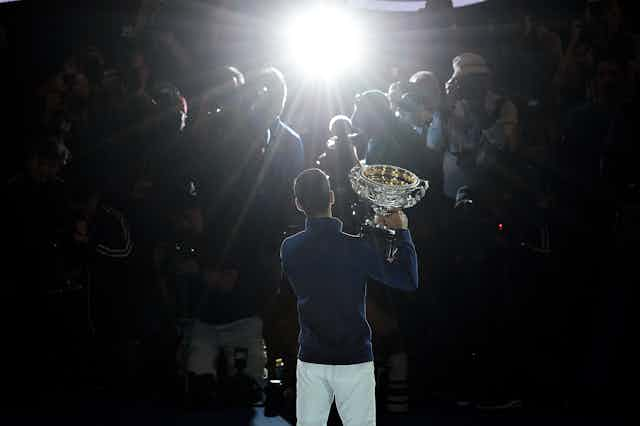The recent revelations by Buzzfeed/BBC and the ABC’s Four Corners program into systematic match fixing in tennis will affect two groups in particular: fans and the Association of Tennis Professionals (ATP), the governing body of men’s tennis.
Let’s first consider the fans. While evoking outrage, this “scandal” should have few implications for most of us. It remains highly unlikely that matches on the grand stages (such as Grand Slams, Davis Cup, Federation Cup) would be rigged. If anything, a minimal percentage of early-round matches in small tournaments may have been affected.
Once a player reaches later rounds and plays on bigger stages, they will have substantial incentives (prize money, ranking points) to compete fully.
In early rounds of small tournaments, however, he might consider an offer from illegal betting syndicates. A main reason is the highly unequal payoff structure in tennis, where few players earn millions, but even the 100th best player in the world may earn less than an average college graduate.
(Bear in mind that travel costs and the salaries of support staff like coaches need to be subtracted from prize money to produce net income. In addition, tennis players need to earn the majority of their lifetime income in a career that spans maximum 10-15 years.)
Compared to baseball, basketball, golf or soccer, tennis players ranked anywhere between 50 - 300 have every reason to be frustrated.
Another reason why match fixing is easier in early rounds at small events relates to smaller crowds. Intentionally losing points, games or the match becomes easier with less witnesses. For example, it is unlikely that Denys Molchanov would have gotten away with such sub-par acting in front of millions of TV spectators. Combining the high incentives (low income) and appealing opportunity (easy to fix a match and increase income) produces an ideal breeding ground for corrupt behaviour.
Finally, it is important to realise that “flagged” matches, where large bets on winning underdogs are observed, can equally have a number of other, harmless explanations. For example, if a spectator observes any of the following, s/he would try to convert her knowledge into cash on the betting market:
- A player is seen injured or sick in practice before a match.
- A player has to travel the following day, being unable to continue in the current tournament anyway.
- In the last qualifying round, the highest seeded player loses because he is guaranteed a spot in the main draw as a “lucky loser” (somebody from the main draw cancelled).
One could think of other situations where an anomaly in betting behaviour may arise that is unrelated to organised match fixing.
Of course, none of these arguments implies we should ignore potential match fixing. But it does mean our experience from watching tennis remains likely unaffected. It’s important to realise this distinction, because doping scandals, for example, carry much more far-reaching implications. Very, very few of us may have been watching a rigged match ever in our life.
Now let’s consider tennis authorities. Let’s assume that at least parts of the allegations are correct and evidence has been suppressed. In this case, the ATP needs to act quickly, take strong action and communicate clearly with the public. What exactly should the ATP do?
Two feasible solutions come to mind. First, an independent and powerful organisation needs to be established to investigate unethical behaviour. This organisation needs to be transparent, sizeable, work closely with betting companies (who also lose from match fixing) and be capable of imposing meaningful penalties.
It appears the Tennis Integrity Unit did not deliver, likely because one or more of the above conditions remained unfulfilled. One could think of a substantial remodelling of this entity or the creation of a new organisation.
Second, the prize money structure needs to be reformed drastically. In men’s tennis, the world’s number 32 earns only 10% of the world’s number one player. In team sports (such as baseball, basketball, soccer, hockey), this fraction lies well above 50% and even in men’s golf surpasses 30%. A long line of research shows that in order to deter people from cheating, paying them well goes a long way.
One could also frame this as an unfair payoff structure and if somebody feels they are not compensated fairly, the moral barrier for illegal actions can become dangerously low.
Unfortunately, tennis authorities have been reluctant to change in the past, especially when compared to other major sports organisations, such as the NBA in basketball. If this continues, the sport is likely to remain subject to cheating, match fixing and other unethical outcomes.
It may well endanger the very foundations of tennis, similar to how repeated doping scandals have destroyed the sport of cycling. The current scandal should be seen as a major warning, maybe the last before disqualification. Code violation ATP.

